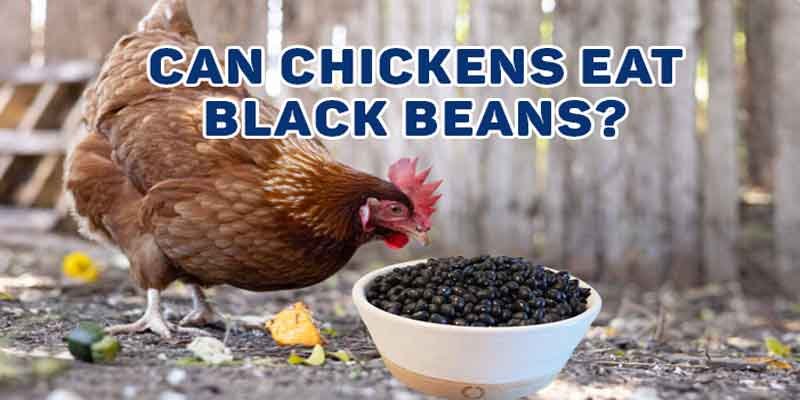Can Chickens Eat Black Beans? The Truth You Didn’t Expect!
Published: 8 Mar 2025
Chicken enthusiasts love to offer their flocks a varied diet. They add occasional black beans to their routine diet. Some of them wonder about the safety and nutritional aspects of serving the beans.
Additionally, they are confused about whether to serve them raw, cooked, or dried. We will uncover the its risks and benefits for chickens. Applying some best practices will make things favorable for the flock.

Should You Serve Black Beans to the Flock Or NOT? A Comprehensive Guide
In this guide, you will have a complete understanding of risks involved in serving black beans to your flocks. We will guide you to properly prepare and make it a safe treat:
Are Black Beans Safe for Chickens?
It is a very important and the most asked question related to snacks. Black beans contain a toxin called phytohemagglutinin, which disturbs the digestive mechanism of backyard birds. So, uncooked or raw beans are not recommended.
Proper cooking can make it a safe and nutritious treat. The heat will destroy the bad toxins in it. So, we recommend only plain and cooked black beans for the flock.
How to Prepare Black Beans for Your Chickens?
Proper preparation is very helpful to maintain a healthy flock. You must get rid of the malicious compounds before serving food to your clucking friends. Here are some simple steps to prepare them for your flock.
Choose High-Quality Beans: We always prefer to serve fresh, mold-free black beans to our birds. Stored or canned beans are not recommended.
Rinse Them Thoroughly: Cleanliness is a prerequisite for any food. Put them into a bowl and rinse under running water to decontaminate the dust or dirt completely.
Soak Them: After decontamination, soak them for a night before serving them to your birds. This will make them softer and easier to cook.
Drain and Rinse Again: After 12 hours of soaking, drain the water and rinse the beans one more time. This will help remove some residual toxins.
Boil or Cook Them: Bring these soaked beans to a rolling boil with water. Preferably, boil them for 30-40 minutes. This will destroy the unhealthy lectins.
Check their Texture: They should be soft and easy for the chickens to eat. If not, boil them for 5-10 minutes according to your choice.
Cool Them: Take time to get them cool down to room temperature before feeding them to chickens. Hot beans will annoy birds.
Serve in Moderation: We have recommended them as an occasional diet for the flock. So, serve them in a small volume. Excessive use of these beans is harmful to chickens.
Can Chickens Eat Raw Black Beans?
Never serve uncooked beans to your chickens. We have already discussed that they contain harmful lectins, “phytohemagglutinin,” which can destroy chickens’ growth. We have to get rid of these fatal compounds. The best way to do that is by boiling these black beans.
Do Chickens Eat Cooked Black Beans?
They would love to have boiled/cooked bean snacks in their diet. The boiling process will eliminate the toxic compounds and make the beans softer—chickens like the soft texture of food. You must ensure that no salt or other seasoning is added. Although cooked beans are safe and nutritious, they should be used occasionally in controlled volume.
Can Chickens Eat Dried Black Beans?
We are not in favor of serving dried beans to the flock. They contain the toxin phytohemagglutinin, which can have disastrous consequences. Their hard texture can cause choking issues for the flock. To avoid problems like vomiting, lathery, and digestive distress, we recommend you avoid serving them to your flock.
Can Chickens Eat Black Beans Sprouts?
No, sprouts also contain toxic compounds. Why feed a diet that threatens the health of your chickens? Like raw beans, sprouts are hazardous for the flock. So, avoid using them and replace them with cooked or boiled black beans.
Can Chickens Eat Black Beans Everyday?
No, daily bean intake is not healthy for the flock. We can only take it as an occasional diet. Replacing beans with the primary diet of chickens will ruin your efforts. Excessive intake will lead to nutritional deficiency and digestive concerns. So, prioritize a nutrient-rich primary diet on a daily basis. Moderation is a key parameter for the flock.
Can Chickens Eat Black Beans Out of a Can?
No, canned black beans are hazardous for the flock. They are full of salts and other spices, which disturb the flock’s digestive system. Excess salt will cause dehydration issues in chickens. So, we suggest only fresh and boiled black beans without any additives.
Can Baby Chickens Eat Black Beans?
No, chicks are not allowed to have a toxic diet. They have a delicate immune system. Their digestive system cannot handle such food. We suggest you serve the chicks a well-formulated starter diet for optimal growth. If you still want to add beans to their diet, ensure a plain and boiled version in limited quantity.
Can Hens Eat Black Beans?
Yes, hens can consume boiled black beans in moderation. They did not have specific effects on egg production and egg quality. Hens require a diet full of fiber and minerals; therefore, add it sparingly to their routine diet. They prefer healthy vegetables, grains, and fruits for an occasional diet plan.
Alternatives of Black Beans for the Flock
If you are concerned with the negative impact of the beans and looking for another occasional treat, then consider these options:
Lentils: Lentils are full of protein, which helps feathers grow. They are easy for the flock to digest. Always serve cooked Lentils in small amounts.
Peas: These tiny snacks contain fiber, minerals, and proteins. Chickpeas and sugar snap peas are famous occasional foods for chickens.
Quinoa: We have recommended cooked quinoa, which includes amino acids. It will help your flocks absorb the nutrients and boost energy.
Oatmeal: Oatmeal can be cooked and used for clucking birds. It contains good amounts of fiber, which helps in the digestive process.
Pumpkin Seeds: They are full of vitamins and antioxidants. Pumpkin Seeds boost the immune system and help chickens combat hazardous parasites.
Sunflower Seeds: Sunflower seeds are rich in fats, proteins, and vitamins. Vitamin E is available in good volume that supports feather health.
Rice: It is full of carbohydrates, which help chickens thrive. We suggest cooked rice without salt and spices. A moderate serving of cooked rice is good.
Conclusion
We have concluded that boiled/cooked black beans are safe for the flock. Raw and dried beans have a high level of toxins, “phytohemagglutinin,” which can disrupt your flock’s digestive system. You must follow the steps recommended for proper bean preparation. They can be used sparingly under vigilant supervision. Consult a veterinarian in case of any unusual effects.

- Be Respectful
- Stay Relevant
- Stay Positive
- True Feedback
- Encourage Discussion
- Avoid Spamming
- No Fake News
- Don't Copy-Paste
- No Personal Attacks

- Be Respectful
- Stay Relevant
- Stay Positive
- True Feedback
- Encourage Discussion
- Avoid Spamming
- No Fake News
- Don't Copy-Paste
- No Personal Attacks


